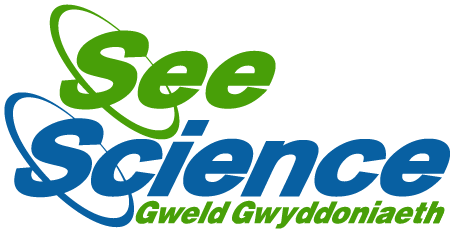Competitions
Last updated: February 6 2026
British Science Week poster competition
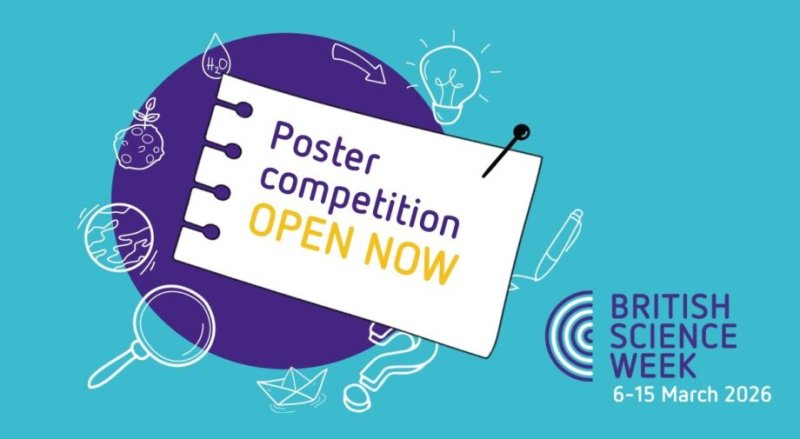 In 2026, the poster competition is taking curiosity to the next level! We’re working with a team of scientists and researchers who are curious about what children and young people think will make a ‘good’/’positive’ childhood in the future.
In 2026, the poster competition is taking curiosity to the next level! We’re working with a team of scientists and researchers who are curious about what children and young people think will make a ‘good’/’positive’ childhood in the future.
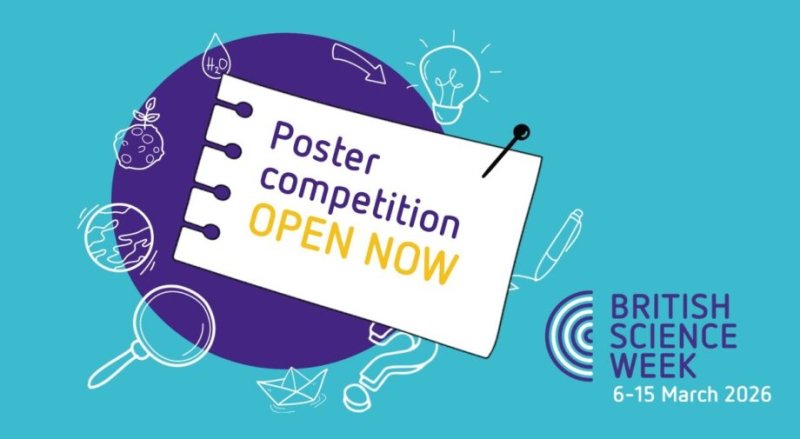 The competition is now open for entries; the closing date is 6 pm on Thursday 16 April 2026.
The competition is now open for entries; the closing date is 6 pm on Thursday 16 April 2026.
Once children and young people have created their posters, you can enter up to five from your setting using our competition submission platform. Please read the full briefs, guidance and rules before entering.
The UK government are thinking about how to build a positive future for children. They are keen to understand children and young people’s own ideas on this, so they are asking: What are children and young people’s visions for a good/positive childhood?
IOP Technicians Award
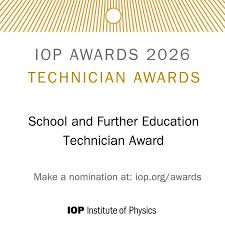 The IOP Technician Award aims to raise the visibility and professional status of technicians by recognising, rewarding and highlighting excellence in their vital work in business, research and education.
The IOP Technician Award aims to raise the visibility and professional status of technicians by recognising, rewarding and highlighting excellence in their vital work in business, research and education.
We want our awards to work for the physics community. We want it to be as easy as possible for you to nominate colleagues and yourselves for the incredible technical excellence taking place in all parts of our physics community.
The IOP Technician Award enables the community to recognise and celebrate the skills and experience of technicians and their contribution to physics. More information here . Closing date 15 March 2026
Nominations for the 2026 IOP School and Further Education Technician Award are now open. Start your nomination now.
The Minds Underground™ STEM Essay Competition 2026
 This competition invites students in Year 12 (and ambitious entrants in Years 10–11 or university re-applicants in Year 13) to engage critically with scientific ideas shaping our world. Across five disciplines - Biology, Chemistry, Physics, Mathematics, and Computer Science - students are encouraged to explore questions that cross traditional subject boundaries, combining creativity, logic, and research to develop insightful arguments.
This competition invites students in Year 12 (and ambitious entrants in Years 10–11 or university re-applicants in Year 13) to engage critically with scientific ideas shaping our world. Across five disciplines - Biology, Chemistry, Physics, Mathematics, and Computer Science - students are encouraged to explore questions that cross traditional subject boundaries, combining creativity, logic, and research to develop insightful arguments.
Open to UK and international students, this competition is ideal for those considering university degrees in STEM or related fields. Entrants must choose one question from any of the categories below and submit a well-structured essay that demonstrates curiosity, analytical thinking, and a flair for scientific communication. Students may enter more than 1 category for the STEM competition (fill a separate submission form if entering for more than one subject).
The 2026 Minds Underground STEM Essay Competition questions are now live. Submit by 3 April 2026!
IOP Teacher Awards
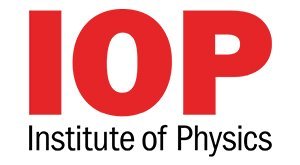
The Teachers of Physics Awards celebrate the success of secondary-level physics teachers who have raised the profile of physics and science in schools and colleges. We know that teachers contribute an immense amount to society, and we wish to accord them the recognition they deserve.
With these awards, we honour teachers alongside distinguished research scientists, technicians and industrialists.
In this way we recognise that without dedicated teachers there would be no physics research community or technological base in society.
The winners receive a prize of £1,000, an engraved glass paperweight and a certificate.
The Teachers of Physics Awards celebrate the success of secondary school and college physics teachers who have raised the profile of physics and science.
Nominations for 2026 are now open. Start your nomination now.
Cardiff Scientific Society - Science Competition
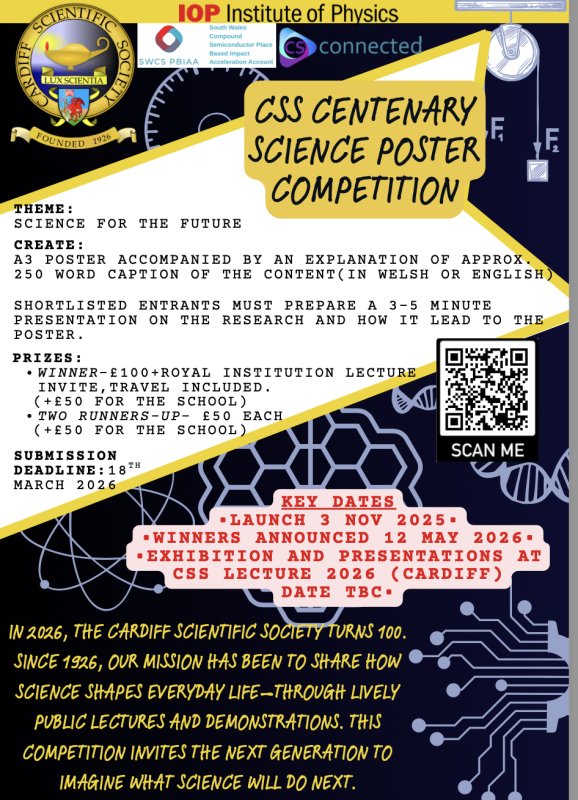 We are celebrating the centenary of the Cardiff Science Society by inviting students across Wales to create a science poster on the theme "Science for the Future." Welcome to applications in Welsh or English. Closing date 18 March 2026 Theme: Science for the Future Format: Poster (A1 design) + ≤ 250 word caption (Welsh or English) Disciplines: Any STEM fields Presentation: Shortlisted candidates should be prepared to give a 3–5 minute presentation on the research behind their poster and how they developed it. Who: Students in Years 10–13 in schools across Wales (state and independent). Language: Welsh or English - bilingual participation welcome. Application type: Individual applications (one teacher contact point per school). Winner: £100 + £50 to the winner's school Runners-up (×2): £50 each + £50 to each school Shortlisted students: Certificates; posters displayed at a CSS lecture in the Autumn term 2026, Cardiff (to be confirmed) Presentation opportunity: The top three (the winner and two runners-up) will be invited to present their posters at a CSS lecture during the centenary term. More information here
We are celebrating the centenary of the Cardiff Science Society by inviting students across Wales to create a science poster on the theme "Science for the Future." Welcome to applications in Welsh or English. Closing date 18 March 2026 Theme: Science for the Future Format: Poster (A1 design) + ≤ 250 word caption (Welsh or English) Disciplines: Any STEM fields Presentation: Shortlisted candidates should be prepared to give a 3–5 minute presentation on the research behind their poster and how they developed it. Who: Students in Years 10–13 in schools across Wales (state and independent). Language: Welsh or English - bilingual participation welcome. Application type: Individual applications (one teacher contact point per school). Winner: £100 + £50 to the winner's school Runners-up (×2): £50 each + £50 to each school Shortlisted students: Certificates; posters displayed at a CSS lecture in the Autumn term 2026, Cardiff (to be confirmed) Presentation opportunity: The top three (the winner and two runners-up) will be invited to present their posters at a CSS lecture during the centenary term. More information here
School Biology Teacher of the Year Award
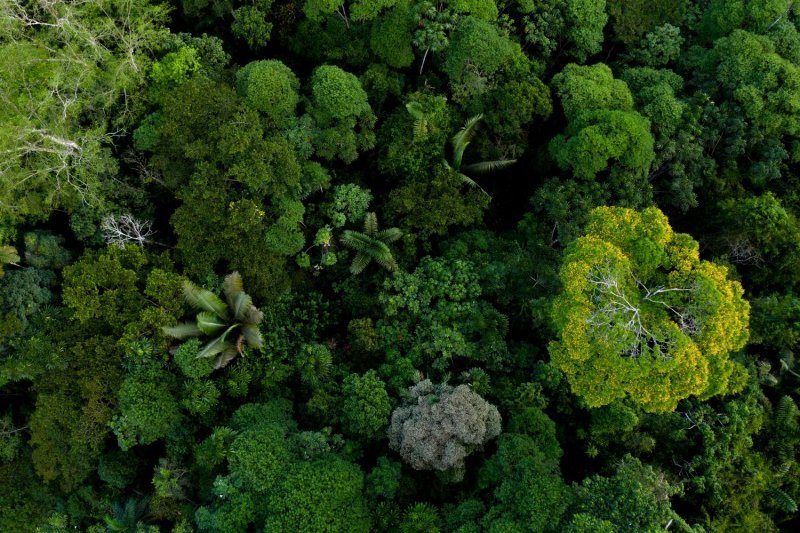 The 2026 award is open for applications until 30 January 2026. The School Biology Teacher of the Year Award seeks to identify the UK's leading secondary education teachers, recognizing the invaluable role they play in educating and inspiring the next generation of biologists. The award rewards teachers who: Demonstrate excellent and inspiring teaching of biology in secondary school or college. Contribute to the development of science throughout the school. Influence the teaching and learning of biology beyond their own institution in schools or other educational settings. The award is open to all teachers working with students aged 11-18, teaching pre-university biology programs of study, and currently working in a school or college in the UK. More information here
The 2026 award is open for applications until 30 January 2026. The School Biology Teacher of the Year Award seeks to identify the UK's leading secondary education teachers, recognizing the invaluable role they play in educating and inspiring the next generation of biologists. The award rewards teachers who: Demonstrate excellent and inspiring teaching of biology in secondary school or college. Contribute to the development of science throughout the school. Influence the teaching and learning of biology beyond their own institution in schools or other educational settings. The award is open to all teachers working with students aged 11-18, teaching pre-university biology programs of study, and currently working in a school or college in the UK. More information here
Samsung Solve for Tomorrow
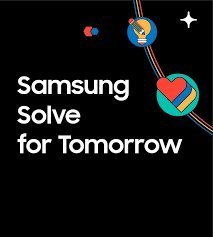 Don't just imagine a better world… invent it Put your students' design thinking skills to the test and create a technology-for-good solution to a real-world problem and have the chance to win technology, mentoring, work experience and their idea on the Samsung big screen in Piccadilly Circus. Using a simple design thinking process inspired by real-world innovation at Samsung, we'll take your students from a blank page to a great idea – in as little as one lesson. The first 500 teachers to register will receive a free Imagination Toolbox – a pack of creative idea cards that your students can use to spark ideas for Samsung Solve for Tomorrow, or any innovation activity in the classroom. Register now to secure yours. Closing date for registration 1 February 2026. More information here
Don't just imagine a better world… invent it Put your students' design thinking skills to the test and create a technology-for-good solution to a real-world problem and have the chance to win technology, mentoring, work experience and their idea on the Samsung big screen in Piccadilly Circus. Using a simple design thinking process inspired by real-world innovation at Samsung, we'll take your students from a blank page to a great idea – in as little as one lesson. The first 500 teachers to register will receive a free Imagination Toolbox – a pack of creative idea cards that your students can use to spark ideas for Samsung Solve for Tomorrow, or any innovation activity in the classroom. Register now to secure yours. Closing date for registration 1 February 2026. More information here
UK CanSat Competition
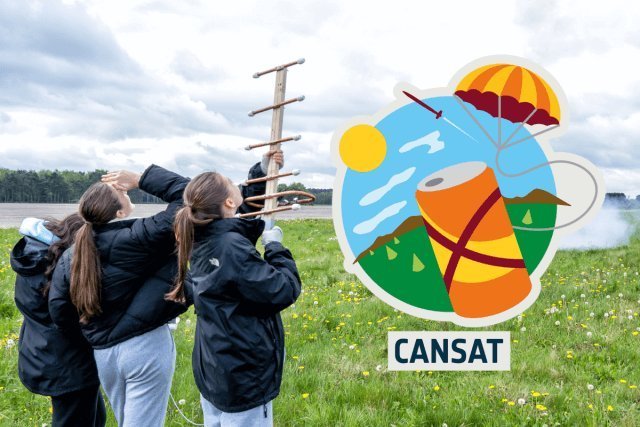 The CanSat competition gives students the opportunity to gain hands-on experience working on a small-scale space project. They are tasked with designing and building their own simulation of a real satellite, integrated within the volume and shape of a soft drink can. The challenge for students is to fit all the major sub-systems found in a satellite, such as power, sensors and a communication system, into this smallest volume. After building their CanSat, teams will be invited to launch events across the UK to launch their CanSats on small rockets, with their CanSats returning to Earth using a parachute designed by the students. Teams main mission is to measure air pressure and air temperature during the descent of the CanSat, with data being transmitted to the students' ground station. They are also tasked with designing a second mission of their choice. It may be based on other satellite missions, a perceived need for scientific data for a specific project, a technology demonstration for a student-designed component, or any other mission that would fit the CanSat's capabilities. The competition runs from September/October - April each year. Read the competition guidelines here. Interested in taking part in the 2025 - 2026 CanSat competition? Register here
The CanSat competition gives students the opportunity to gain hands-on experience working on a small-scale space project. They are tasked with designing and building their own simulation of a real satellite, integrated within the volume and shape of a soft drink can. The challenge for students is to fit all the major sub-systems found in a satellite, such as power, sensors and a communication system, into this smallest volume. After building their CanSat, teams will be invited to launch events across the UK to launch their CanSats on small rockets, with their CanSats returning to Earth using a parachute designed by the students. Teams main mission is to measure air pressure and air temperature during the descent of the CanSat, with data being transmitted to the students' ground station. They are also tasked with designing a second mission of their choice. It may be based on other satellite missions, a perceived need for scientific data for a specific project, a technology demonstration for a student-designed component, or any other mission that would fit the CanSat's capabilities. The competition runs from September/October - April each year. Read the competition guidelines here. Interested in taking part in the 2025 - 2026 CanSat competition? Register here
Earth Prize
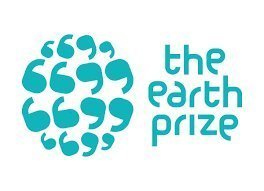 The Earth Prize is an annual $100,000 global environmental sustainability competition for students between the ages of 13 and 19, which rewards the teams whose projects have the greatest potential to address environmental issues. Through the Earth Prize competition, students are inspired, educated, mentored and empowered to solve environmental sustainability problems. Registration is open from 1st September 2025 to 10th January 2026. Complete the online registration form to join the Earth Prize Discord Community, where you will have access to exclusive content and mentoring. More information here.
The Earth Prize is an annual $100,000 global environmental sustainability competition for students between the ages of 13 and 19, which rewards the teams whose projects have the greatest potential to address environmental issues. Through the Earth Prize competition, students are inspired, educated, mentored and empowered to solve environmental sustainability problems. Registration is open from 1st September 2025 to 10th January 2026. Complete the online registration form to join the Earth Prize Discord Community, where you will have access to exclusive content and mentoring. More information here.
MathWorks Math Modeling Challenge
 The M3 Challenge is an online applied mathematics competition that inspires participants to pursue STEM education and careers. Working in teams of three to five students, participants have 14 consecutive hours to solve an open math modeling problem based on a real issue during the challenge weekend. Usually, the problem has a socially conscious theme - equity, the environment, conservation or recycling, energy use, health, and other topics that young people care about. The challenge gives students the opportunity to use mathematical modeling processes to represent, analyse, make predictions and provide insight into real world phenomena. The competition's final presentation and awards ceremony will be held in New York City at the end of April - an all-expenses-paid experience for the final teams. These top teams will receive scholarships towards further education, with members of the overall winning team receiving $20,000 (»£16,000) For students aged: 16–19 (England and Wales only) Closing date for registration: 20 February 2026. For resources and to register, visit the competition website
The M3 Challenge is an online applied mathematics competition that inspires participants to pursue STEM education and careers. Working in teams of three to five students, participants have 14 consecutive hours to solve an open math modeling problem based on a real issue during the challenge weekend. Usually, the problem has a socially conscious theme - equity, the environment, conservation or recycling, energy use, health, and other topics that young people care about. The challenge gives students the opportunity to use mathematical modeling processes to represent, analyse, make predictions and provide insight into real world phenomena. The competition's final presentation and awards ceremony will be held in New York City at the end of April - an all-expenses-paid experience for the final teams. These top teams will receive scholarships towards further education, with members of the overall winning team receiving $20,000 (»£16,000) For students aged: 16–19 (England and Wales only) Closing date for registration: 20 February 2026. For resources and to register, visit the competition website
Green Power Competition
 The Greenpower Education Trust is a UK charity that gets young people enthusiastic about science and engineering by challenging them to design, build and race an electric car. We supply age appropriate Kit Cars, which can be built at school, college or elsewhere and raced in motorsport venues at events organized by Greenpower. Alternatively, older participants can design and build their own car according to our regulations. The Greenpower challenge uses the excitement of motorsport to inspire young people to excel in Science, Technology, Engineering and Mathematics (STEM). The F24 season runs from April to October. The season starts with a test day and the Opening of the Sea. Further test days follow and then the heats begin, taking place across the country until the end of September where we host the International Final at Goodwood in October for qualified teams. More information here
The Greenpower Education Trust is a UK charity that gets young people enthusiastic about science and engineering by challenging them to design, build and race an electric car. We supply age appropriate Kit Cars, which can be built at school, college or elsewhere and raced in motorsport venues at events organized by Greenpower. Alternatively, older participants can design and build their own car according to our regulations. The Greenpower challenge uses the excitement of motorsport to inspire young people to excel in Science, Technology, Engineering and Mathematics (STEM). The F24 season runs from April to October. The season starts with a test day and the Opening of the Sea. Further test days follow and then the heats begin, taking place across the country until the end of September where we host the International Final at Goodwood in October for qualified teams. More information here
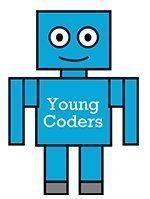 Young Coders Competition
Young Coders Competition
The Young Coders Competition is an opportunity for young people to learn to code using Scratch, develop key web skills and think creatively. Participants create a project, either individually or in teams of up to 6. Age. 8-13 Register interest now via the website to access free resources to help guide learners, plus more information about the competition.
DVLA Coding Competition
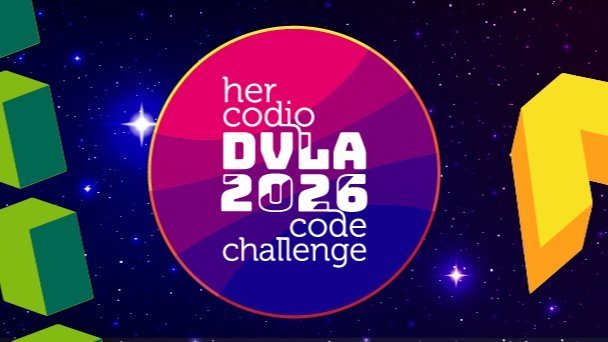 The DVLA's STEM Program is evolving to better support schools throughout the academic year. This means that the annual Her Code will take a break in 2025. From now on, the event will be held in July instead of December. This change follows feedback from all parts of the education sector to fit in better with the school year. The next DVLA Code Challenge takes place on 7 July 2026 The 2026 challenge is open to children and young adults aged 7 to 16. Your School, College or Group can compete in any or all of the two categories DVLA Code Challenge for students aged 7 to 11 DVLA Code Challenge for students aged 11 to 16 The Code Challenge enables students of all ages to develop their problem solving skills, work in a team and improve their knowledge of computer programming in a fun and innovative way and also to win IT Equipment for their schools or Groups. To register for the event in any of the categories, just click here and read the Competition Terms and Conditions then send us the completed Registration Form
The DVLA's STEM Program is evolving to better support schools throughout the academic year. This means that the annual Her Code will take a break in 2025. From now on, the event will be held in July instead of December. This change follows feedback from all parts of the education sector to fit in better with the school year. The next DVLA Code Challenge takes place on 7 July 2026 The 2026 challenge is open to children and young adults aged 7 to 16. Your School, College or Group can compete in any or all of the two categories DVLA Code Challenge for students aged 7 to 11 DVLA Code Challenge for students aged 11 to 16 The Code Challenge enables students of all ages to develop their problem solving skills, work in a team and improve their knowledge of computer programming in a fun and innovative way and also to win IT Equipment for their schools or Groups. To register for the event in any of the categories, just click here and read the Competition Terms and Conditions then send us the completed Registration Form
Train Like an Astronaut: The Challenge of Walking to the Moon
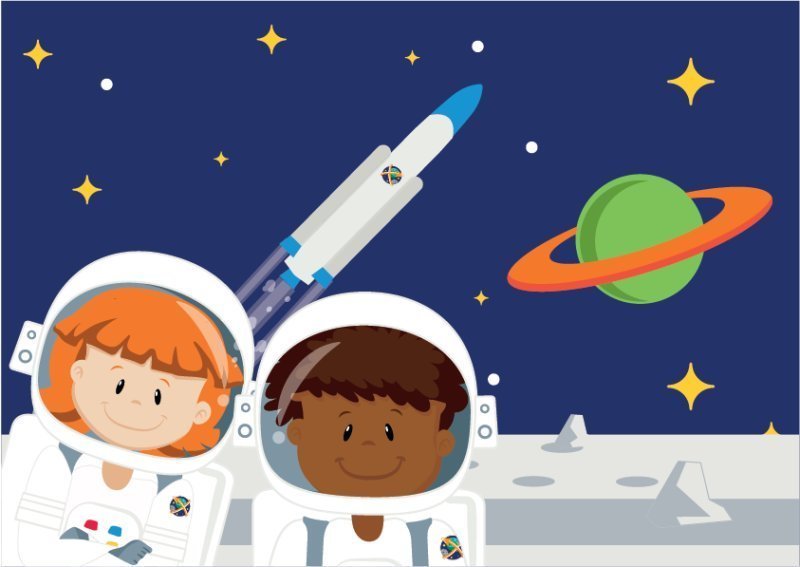 Every school year, from September to August, teams of students up to the age of 14 can take part in the Moon Walk Challenge. Teams from all over the world complete Mission X activities and submit them online to earn steps. The steps submitted by all the participating teams help the Mission X mascots, Luna and Leo, to walk 384,400 km - the distance from the Earth to the Moon. Participants will receive a certificate and an invitation to a virtual event hosted by ESA Education. In addition, teacher training sessions, national events and summer camps are held in several countries. You can read more about Mission X in your country by looking at your country page in the menu bar at the top of this page
Every school year, from September to August, teams of students up to the age of 14 can take part in the Moon Walk Challenge. Teams from all over the world complete Mission X activities and submit them online to earn steps. The steps submitted by all the participating teams help the Mission X mascots, Luna and Leo, to walk 384,400 km - the distance from the Earth to the Moon. Participants will receive a certificate and an invitation to a virtual event hosted by ESA Education. In addition, teacher training sessions, national events and summer camps are held in several countries. You can read more about Mission X in your country by looking at your country page in the menu bar at the top of this page
AstroPi - Mission Space Laboratory
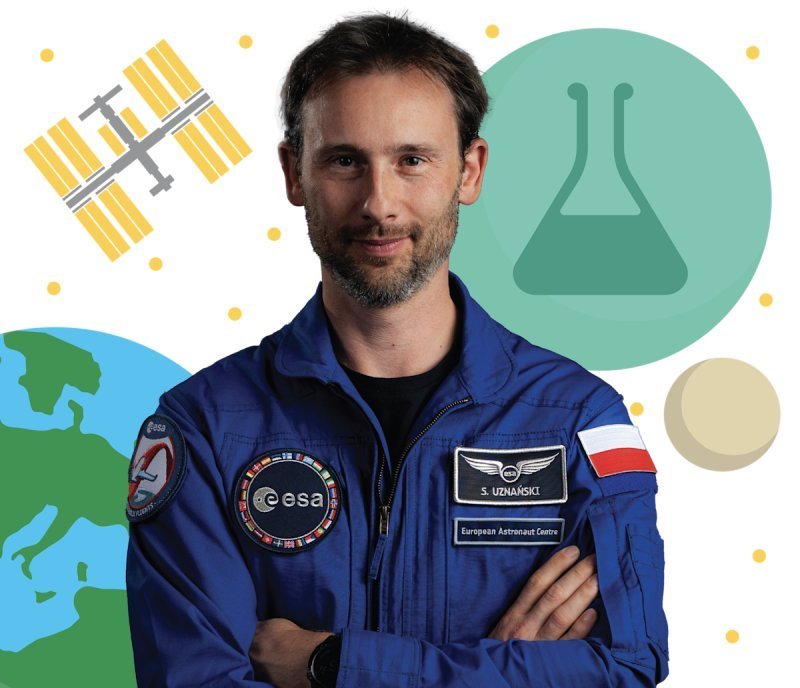 Mission Space Lab offers teams of young people the opportunity to carry out scientific experiments on board the International Space Station. In Mission Space Lab teams are invited to write computer programs that solve a scientific task in space: to collect data to calculate the speed at which the International Space Station (ISS) is traveling as accurately as possible. To achieve this, teams write a Python program to first use the Astro Pi's sensors or computer camera and collect data about the orientation and motion of the ISS as it orbits the Earth, and then calculate the speed of the ISS based on the collected data. . Taking part in the Astro Pi Mission Space Lab enables young people to learn about the ISS, about collecting and using data to answer a scientific question, and about creating and solving computer program problems. They also have an exciting opportunity to learn about the science of the ISS's motion and orbit. Qualifying programs will be used on the ISS, and teams will receive certificates and data collected in space. More information here
Mission Space Lab offers teams of young people the opportunity to carry out scientific experiments on board the International Space Station. In Mission Space Lab teams are invited to write computer programs that solve a scientific task in space: to collect data to calculate the speed at which the International Space Station (ISS) is traveling as accurately as possible. To achieve this, teams write a Python program to first use the Astro Pi's sensors or computer camera and collect data about the orientation and motion of the ISS as it orbits the Earth, and then calculate the speed of the ISS based on the collected data. . Taking part in the Astro Pi Mission Space Lab enables young people to learn about the ISS, about collecting and using data to answer a scientific question, and about creating and solving computer program problems. They also have an exciting opportunity to learn about the science of the ISS's motion and orbit. Qualifying programs will be used on the ISS, and teams will receive certificates and data collected in space. More information here
Join Climate Detectives
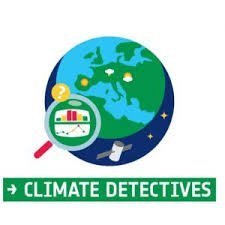 Did you know you can make a difference in understanding and protecting planet Earth? Join Climate Detectives, a project run by ESA and ESERO! Your investigation can focus on climate change but also on everything about our planet Earth and its care: the environment, sustainable lifestyles, biodiversity, air quality, forests, oceans and much more. Be curious and become a Climate Detective! Together, student detectives work to protect our planet! Teams can choose between two levels of engagement. By participating in the new beginner category, Climate Detectives Kids, teams can complete fun hands-on activities, and earn badges to become a certified climate and Earth detective! For a bigger challenge, teams can complete a full investigation of their choice: identify the problem they want to analyze, collect data, and share their results with the Climate Detectives community. Selected teams will be invited for an exciting learning and celebration event at the end of this school year! Find out more here
Did you know you can make a difference in understanding and protecting planet Earth? Join Climate Detectives, a project run by ESA and ESERO! Your investigation can focus on climate change but also on everything about our planet Earth and its care: the environment, sustainable lifestyles, biodiversity, air quality, forests, oceans and much more. Be curious and become a Climate Detective! Together, student detectives work to protect our planet! Teams can choose between two levels of engagement. By participating in the new beginner category, Climate Detectives Kids, teams can complete fun hands-on activities, and earn badges to become a certified climate and Earth detective! For a bigger challenge, teams can complete a full investigation of their choice: identify the problem they want to analyze, collect data, and share their results with the Climate Detectives community. Selected teams will be invited for an exciting learning and celebration event at the end of this school year! Find out more here
The Big Bang competition
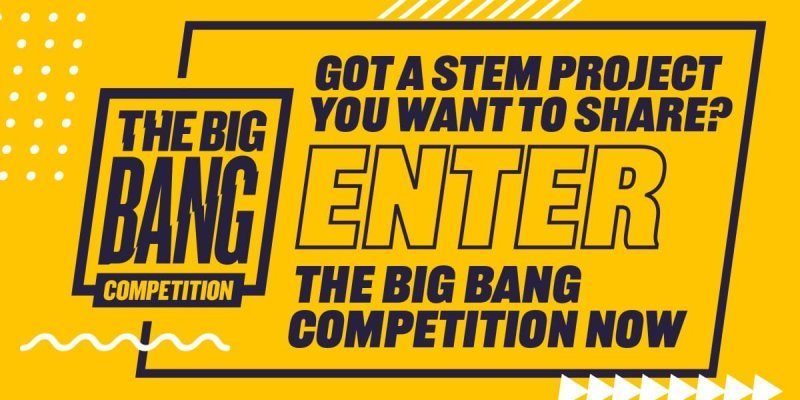 Do you know the next space explorer or climate change hero? Do you have an idea that will transform people's lives? Inspire inquisitive minds to think big, challenge facts, ask questions and invent solutions with the UK's leading annual science, engineering and technology competition. Young people are amazing - help them shine and change the world. Join the fun! (…and develop skills along the way); build confidence and teamwork skills; problem solving; get expert feedback. Celebrate and share your work. The UK Big Bang Young Scientists and Engineers Competition is free, and is open to young people in the UK aged 11 to 18 in state-funded secondary education, who are home-schooled or who apply as part of a community group. Competitors can only enter one project, either alone or as part of a team. The Big Bang Competition will open in the autumn term. May of information here
Do you know the next space explorer or climate change hero? Do you have an idea that will transform people's lives? Inspire inquisitive minds to think big, challenge facts, ask questions and invent solutions with the UK's leading annual science, engineering and technology competition. Young people are amazing - help them shine and change the world. Join the fun! (…and develop skills along the way); build confidence and teamwork skills; problem solving; get expert feedback. Celebrate and share your work. The UK Big Bang Young Scientists and Engineers Competition is free, and is open to young people in the UK aged 11 to 18 in state-funded secondary education, who are home-schooled or who apply as part of a community group. Competitors can only enter one project, either alone or as part of a team. The Big Bang Competition will open in the autumn term. May of information here
Explore climate issues with ESA's Climate Detectives and Kids Climate Detectives
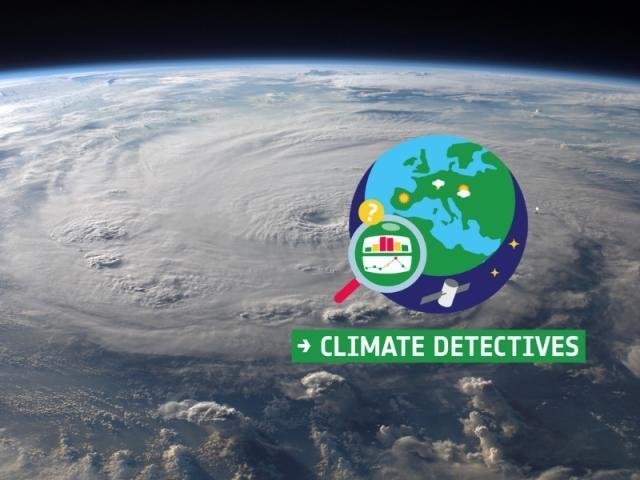 ESERO-UK is inviting teachers and student teams to join and join the ESA school projects Climate Detectives and Children's Climate Detectives. Registration is open from September each year. ESA's Climate Detectives is a competition open to students aged 8 to 19. Teams of students, supported by their teacher, are called upon to make a difference by identifying a climate problem, researching it using available Earth Observation data or taking measurements on the ground, and then proposing a way to help reduce the problem. The ESA Climate Detectives Kids is a challenge where teams of pupils up to the age of 12 complete activities to earn badges. This category is ideal for beginners and is not competitive. Register to take part here
ESERO-UK is inviting teachers and student teams to join and join the ESA school projects Climate Detectives and Children's Climate Detectives. Registration is open from September each year. ESA's Climate Detectives is a competition open to students aged 8 to 19. Teams of students, supported by their teacher, are called upon to make a difference by identifying a climate problem, researching it using available Earth Observation data or taking measurements on the ground, and then proposing a way to help reduce the problem. The ESA Climate Detectives Kids is a challenge where teams of pupils up to the age of 12 complete activities to earn badges. This category is ideal for beginners and is not competitive. Register to take part here
Tech Awards for Young People
 Are you a pioneer? Do you have an idea that could make life easier, simpler or better? Do you have a skill you'd like to showcase? Or are you interested in an area you would like to research? The TeenTech Awards are for students aged 11 to 16 (Years 7 to 11) and 17 to 19 (Years 12 to 13) and you can work individually, or in a team of up to three. They are a great and powerful opportunity to develop your potential and demonstrate qualities valued by employers and further education. The best projects go on to the TeenTech Awards Final for judging. Register here and find out more
Are you a pioneer? Do you have an idea that could make life easier, simpler or better? Do you have a skill you'd like to showcase? Or are you interested in an area you would like to research? The TeenTech Awards are for students aged 11 to 16 (Years 7 to 11) and 17 to 19 (Years 12 to 13) and you can work individually, or in a team of up to three. They are a great and powerful opportunity to develop your potential and demonstrate qualities valued by employers and further education. The best projects go on to the TeenTech Awards Final for judging. Register here and find out more
UK Chemistry Olympiad (UKChO)
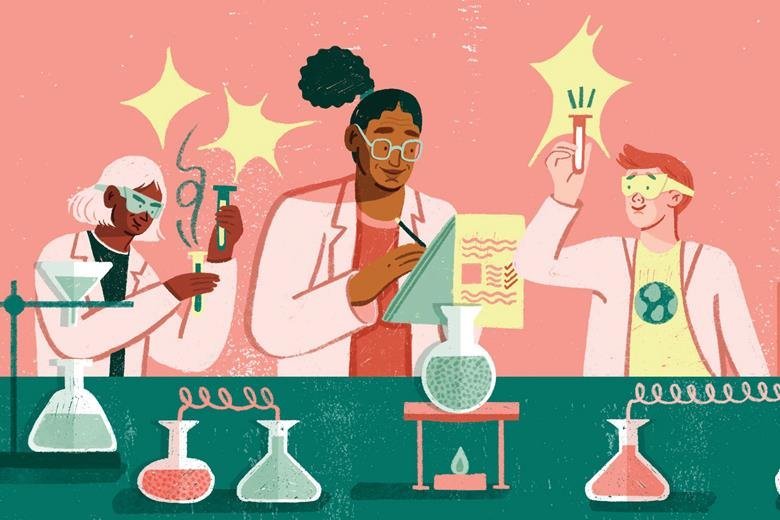 Want to take part in a chemistry competition for secondary students across the British Isles Designed to challenge and inspire, the UK Chemistry Olympiad (UKChO) is a unique opportunity for students to push themselves further and excel in the field of chemistry. Budding chemists will develop critical problem-solving skills, learn to think more creatively and have the opportunity to test their knowledge in new real-world situations. They could even find themselves representing the UK at the prestigious International Chemistry Olympiad. Register until 5 January and to find out more go here.
Want to take part in a chemistry competition for secondary students across the British Isles Designed to challenge and inspire, the UK Chemistry Olympiad (UKChO) is a unique opportunity for students to push themselves further and excel in the field of chemistry. Budding chemists will develop critical problem-solving skills, learn to think more creatively and have the opportunity to test their knowledge in new real-world situations. They could even find themselves representing the UK at the prestigious International Chemistry Olympiad. Register until 5 January and to find out more go here.
UK Youth Rockets Challenge
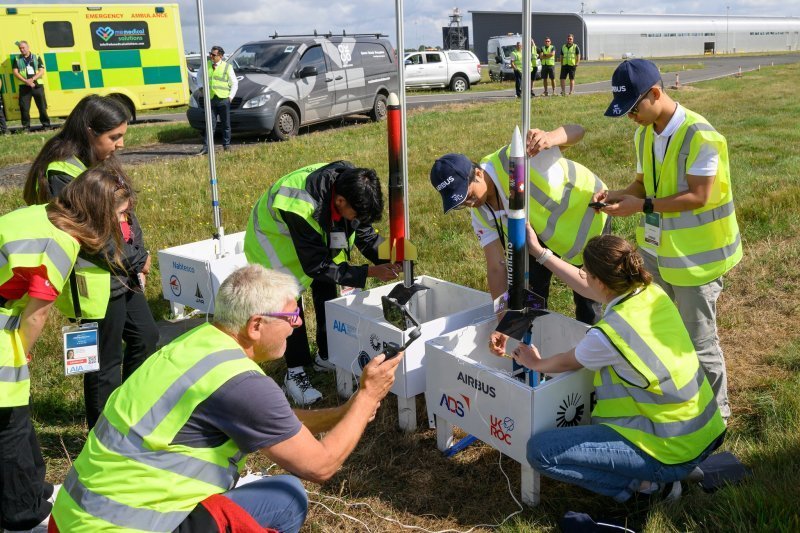 The UK Youth Rocket Challenge (UKROC) is a great way to engage the next generation of engineers with hands-on experience of building and delivering complex missions. This is an exciting way to learn more about maths and science, with the UK winners having the opportunity to compete against teams from France, the USA and Japan in the International Finals. The challenge is aimed at students aged 11 – 18 from any secondary schools, colleges, educational facilities or youth groups to design, build and launch a model rocket with a vulnerable payload. The rocket must reach a certain height with a certain total flight length and must adhere to the specific installation rules. The competition's rules and scoring parameters change each year to challenge the students' ingenuity and encourage a new approach to rocket design. More information here
The UK Youth Rocket Challenge (UKROC) is a great way to engage the next generation of engineers with hands-on experience of building and delivering complex missions. This is an exciting way to learn more about maths and science, with the UK winners having the opportunity to compete against teams from France, the USA and Japan in the International Finals. The challenge is aimed at students aged 11 – 18 from any secondary schools, colleges, educational facilities or youth groups to design, build and launch a model rocket with a vulnerable payload. The rocket must reach a certain height with a certain total flight length and must adhere to the specific installation rules. The competition's rules and scoring parameters change each year to challenge the students' ingenuity and encourage a new approach to rocket design. More information here
UK CDC competition
 The UK Space Design Competition is a science, engineering and business challenge designed to simulate life in industry. Teams are given a list of requirements for settling a space and are tasked with drawing up a detailed design which they present to a panel of judges from industry, academia and business. Open to UK secondary and sixth form students (years 10 – 13), teams can enter the UKSDC through our regional or digital qualifiers (introduced in 2020 to replace our normal regional qualifiers in a COVID-safe way). Winning teams from these entry points take part in our national final; a residential competition weekend hosted by Imperial College London! A select group of winners are then invited to go from there to the International Space Settlement Design Competition (ISSDC) at NASA's Kennedy Space Centre. Our aim is to present interesting events that demonstrate the value that students could gain from further studies or careers in STEM disciplines. We hope you will choose to join us on this journey! Registration for 2024-25 is now closed. More details here
The UK Space Design Competition is a science, engineering and business challenge designed to simulate life in industry. Teams are given a list of requirements for settling a space and are tasked with drawing up a detailed design which they present to a panel of judges from industry, academia and business. Open to UK secondary and sixth form students (years 10 – 13), teams can enter the UKSDC through our regional or digital qualifiers (introduced in 2020 to replace our normal regional qualifiers in a COVID-safe way). Winning teams from these entry points take part in our national final; a residential competition weekend hosted by Imperial College London! A select group of winners are then invited to go from there to the International Space Settlement Design Competition (ISSDC) at NASA's Kennedy Space Centre. Our aim is to present interesting events that demonstrate the value that students could gain from further studies or careers in STEM disciplines. We hope you will choose to join us on this journey! Registration for 2024-25 is now closed. More details here
The Moon Camp
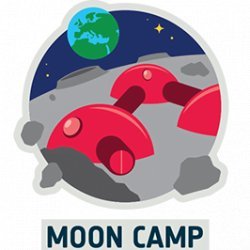 Take part in Moon Camp and design a space habitat! Take on the role of a new space adventurer with your team and design a habitat on the surface of the moon or go beyond the Moon and explore other worlds in our Solar System. Choose the topic and format that best suits your team and get creative! Your project can range from: scientific experiment practical project space infrastructure design game based design 3D design of astronaut base 3D printed model virtual or augmented reality world… and much more!! Moon Camp is a partnership between ESA and the national ESEROs and the Airbus Foundation. All teams that present a project will receive a certificate of participation and will be invited to the final online livestream event with an astronaut. More information here Entries: open between 10 September 2024 and 28 April 2025 Mid-year online event with a space expert: February 2025, open to all interested students and teachers. Final online event with an astronaut: May or June 2025, open to all participants who submitted a project.
Take part in Moon Camp and design a space habitat! Take on the role of a new space adventurer with your team and design a habitat on the surface of the moon or go beyond the Moon and explore other worlds in our Solar System. Choose the topic and format that best suits your team and get creative! Your project can range from: scientific experiment practical project space infrastructure design game based design 3D design of astronaut base 3D printed model virtual or augmented reality world… and much more!! Moon Camp is a partnership between ESA and the national ESEROs and the Airbus Foundation. All teams that present a project will receive a certificate of participation and will be invited to the final online livestream event with an astronaut. More information here Entries: open between 10 September 2024 and 28 April 2025 Mid-year online event with a space expert: February 2025, open to all interested students and teachers. Final online event with an astronaut: May or June 2025, open to all participants who submitted a project.
Cambridge High Secondary Science Competition Age: 16–18 Registration opens: now
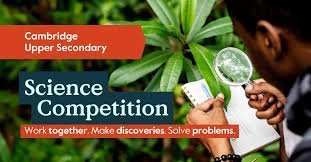 The Cambridge High School Science Competition, run by Cambridge Assessment, is an exciting extra-curricular activity for teams of aspiring scientists studying with Cambridge's IGCSE or O-Level science programmes. Teams of three to six students choose a topic and work on a scientific investigation over 20-25 hours. The competition encourages investigations that have some practical or community relevance and an eye on sustainability. Projects can include laboratory work and should include creative and collaborative working, critical thinking and reflection. Students should be given the opportunity to present their results to a wider audience, perhaps at a science fair or other school event. Teachers provide initial project evaluations and the best are proposed for consideration by a panel of experts. The winning team receives a certificate and is featured on the competition website. The competition runs twice a year, so keep an eye out for all the dates on the website. More information here
The Cambridge High School Science Competition, run by Cambridge Assessment, is an exciting extra-curricular activity for teams of aspiring scientists studying with Cambridge's IGCSE or O-Level science programmes. Teams of three to six students choose a topic and work on a scientific investigation over 20-25 hours. The competition encourages investigations that have some practical or community relevance and an eye on sustainability. Projects can include laboratory work and should include creative and collaborative working, critical thinking and reflection. Students should be given the opportunity to present their results to a wider audience, perhaps at a science fair or other school event. Teachers provide initial project evaluations and the best are proposed for consideration by a panel of experts. The winning team receives a certificate and is featured on the competition website. The competition runs twice a year, so keep an eye out for all the dates on the website. More information here
British Model Aviation Association 2025 University and School Load Challenges
 The BMFA's Cargo Challenges require students to design, build and fly cargo model aircraft. The competitions have evolved to stretch the abilities of the students taking part and there is no doubt that the development of a good aircraft requires each team to demonstrate design talent, technical knowledge and teamwork. The judging is by a panel of professional engineers and the competition has attracted very favorable comments from external examiners, the challenge is sponsored by the Royal Aeronautical Society and also enjoys the support of BAE SYSTEMS, Rolls Royce, RAF Engineering and Royal Air Force Model Aircraft. Association. The competition is open to all students in full-time education including home education and accredited apprenticeships, based in the UK and Europe. Entries must be received by 1st April 2025, however, due to the increased interest in this competition this year again there will be a limit on the number of entries received. An entry fee is payable on submission of a completed entry form, for 2025 we have significantly reduced the entry fee for all competition classes. The flying and presentation element of the competition will take place on 18 and 19 June 2025 at the British Model Flying Association National Center near Grantham in Lincolnshire, teams can arrive on 17 June for set-up and practice by prior arrangement. Go here for further details For detailed information or assistance contact the Challenge Coordinator, Manny Williamson on manny@bmfa.org
The BMFA's Cargo Challenges require students to design, build and fly cargo model aircraft. The competitions have evolved to stretch the abilities of the students taking part and there is no doubt that the development of a good aircraft requires each team to demonstrate design talent, technical knowledge and teamwork. The judging is by a panel of professional engineers and the competition has attracted very favorable comments from external examiners, the challenge is sponsored by the Royal Aeronautical Society and also enjoys the support of BAE SYSTEMS, Rolls Royce, RAF Engineering and Royal Air Force Model Aircraft. Association. The competition is open to all students in full-time education including home education and accredited apprenticeships, based in the UK and Europe. Entries must be received by 1st April 2025, however, due to the increased interest in this competition this year again there will be a limit on the number of entries received. An entry fee is payable on submission of a completed entry form, for 2025 we have significantly reduced the entry fee for all competition classes. The flying and presentation element of the competition will take place on 18 and 19 June 2025 at the British Model Flying Association National Center near Grantham in Lincolnshire, teams can arrive on 17 June for set-up and practice by prior arrangement. Go here for further details For detailed information or assistance contact the Challenge Coordinator, Manny Williamson on manny@bmfa.org
Design a vehicle for your future
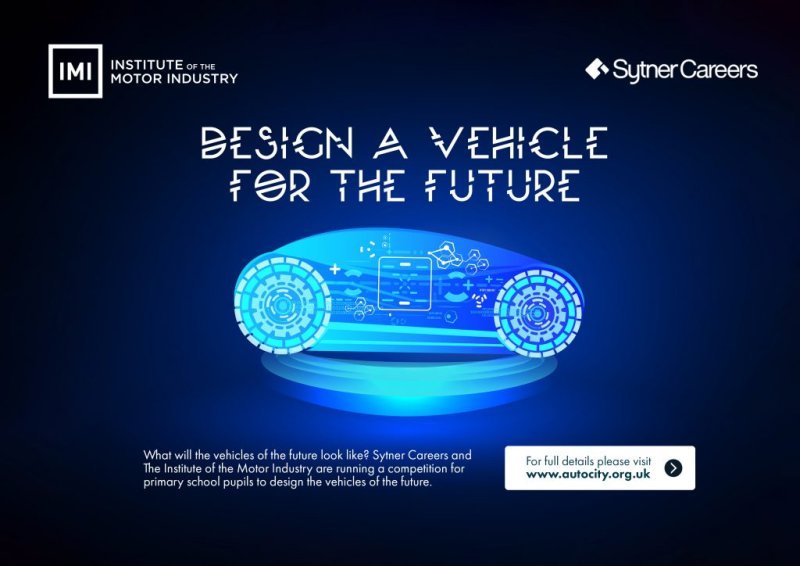 Together we have been working hard to prepare the industry for the future, but we have run out of ideas! So, we need your help to create a brand new vehicle that will be ready for 2030. Can you imagine what kind of vehicles will be popular in 2030? What will they look like? How will they run? Will there be some fun things in them that haven't been invented yet? Follow the steps below and help us design the vehicle of the future. Download your primary school age i-design-the-future-competition pack STEP 1 – Plan and design the look of your vehicle STEP 2 – Name your vehicle STEP 3 – Create a logo for your vehicle STEP 4 – List 3 new “future” features for your vehicle STEP 5 – Put all these ideas together to design a fun poster advertising your vehicle for the future THE PRIZE: An amazing automotive related prize will be awarded to the winner! DEADLINE – Ongoing Please email your applications to careers@theimi.org.uk or post to The Careers Team, Institute of the Motor Industry, Fanshaws, Brickendon, Hertford, Hertfordshire SG13 8PQ
Together we have been working hard to prepare the industry for the future, but we have run out of ideas! So, we need your help to create a brand new vehicle that will be ready for 2030. Can you imagine what kind of vehicles will be popular in 2030? What will they look like? How will they run? Will there be some fun things in them that haven't been invented yet? Follow the steps below and help us design the vehicle of the future. Download your primary school age i-design-the-future-competition pack STEP 1 – Plan and design the look of your vehicle STEP 2 – Name your vehicle STEP 3 – Create a logo for your vehicle STEP 4 – List 3 new “future” features for your vehicle STEP 5 – Put all these ideas together to design a fun poster advertising your vehicle for the future THE PRIZE: An amazing automotive related prize will be awarded to the winner! DEADLINE – Ongoing Please email your applications to careers@theimi.org.uk or post to The Careers Team, Institute of the Motor Industry, Fanshaws, Brickendon, Hertford, Hertfordshire SG13 8PQ
VEX Robotics Competition Competition Brings STEM Skills to Life
 All students are natural scientists and engineers. They love to question, tinker, experiment, and play. VEX competitions foster these skills and take advantage of the motivating effects of competitions and robotics to help each student create an identity as a STEM learner. VEX competitions are also a great way to introduce students to valuable soft skills such as communication, collaboration and time management in a fun and authentic way. The VEX Robotics competition prepares students to become future innovators, with 95% of participants reporting increased interest in STEM subject areas and pursuing STEM-related careers. Tournaments are held throughout the year at local, regional and national levels culminating in the VEX Robotics World Championship every April! More information here
All students are natural scientists and engineers. They love to question, tinker, experiment, and play. VEX competitions foster these skills and take advantage of the motivating effects of competitions and robotics to help each student create an identity as a STEM learner. VEX competitions are also a great way to introduce students to valuable soft skills such as communication, collaboration and time management in a fun and authentic way. The VEX Robotics competition prepares students to become future innovators, with 95% of participants reporting increased interest in STEM subject areas and pursuing STEM-related careers. Tournaments are held throughout the year at local, regional and national levels culminating in the VEX Robotics World Championship every April! More information here
BEIA STEM Competition
 Are you ready to tackle one of the biggest challenges of our time? The BIEA STEM Competition 2025 invites young innovators around the world to take on the theme "Feast Forward: Fostering Change for the Planet". This year, we are exploring how technology can revolutionize food production to sustainably feed a growing global population while protecting our planet's precious resources. From climate-smart agriculture to breakthroughs in food technology, this is your chance to showcase your ideas, develop ground-breaking solutions, and inspire change in the real world. Compete against peers from all over the world, collaborate with industry leaders, and make your mark on the future of sustainability. Whether you are passionate about environmental conservation, cutting edge technology, or creating a better future for everyone, this competition is your platform to shine. The 2025 competition is mainly aimed at students aged 6 to 17/18 (secondary schools). The competition will accept online submissions. Students can compete as part of a team (of up to five) or as an individual competitor (however, individual entries may lose marks in the team aspect). Schools can have more than one entry. Students who cannot attend school can submit proposals as individual contestants, although all contestants under the age of 18 or in secondary school must be registered by a responsible adult (e.g. a teacher or parent). The competition is currently open and will close on 30 March 2025. More information here
Are you ready to tackle one of the biggest challenges of our time? The BIEA STEM Competition 2025 invites young innovators around the world to take on the theme "Feast Forward: Fostering Change for the Planet". This year, we are exploring how technology can revolutionize food production to sustainably feed a growing global population while protecting our planet's precious resources. From climate-smart agriculture to breakthroughs in food technology, this is your chance to showcase your ideas, develop ground-breaking solutions, and inspire change in the real world. Compete against peers from all over the world, collaborate with industry leaders, and make your mark on the future of sustainability. Whether you are passionate about environmental conservation, cutting edge technology, or creating a better future for everyone, this competition is your platform to shine. The 2025 competition is mainly aimed at students aged 6 to 17/18 (secondary schools). The competition will accept online submissions. Students can compete as part of a team (of up to five) or as an individual competitor (however, individual entries may lose marks in the team aspect). Schools can have more than one entry. Students who cannot attend school can submit proposals as individual contestants, although all contestants under the age of 18 or in secondary school must be registered by a responsible adult (e.g. a teacher or parent). The competition is currently open and will close on 30 March 2025. More information here
